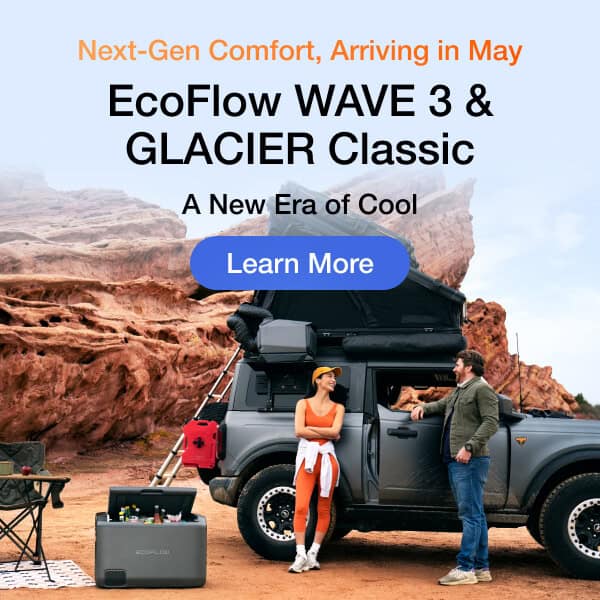A generator lets you enjoy all the perks of being outdoors with your friends and family without sacrificing comfort and safety.
But some generators are better for your camping trip than others, especially when it comes to battery capacity, toxic fumes, and noise.
The most common debate comes down to two types of generators: solar or petrol-powered.
Both can keep your lights, laptop, grill, and other electrical devices running. One runs on clean, renewable sunlight, the other on noisy, dirty, and potentially hazardous petrol.
Here, we compare the two machines, so you can decide which energy solution is better for camping.
Solar Generator
A solar generator usually consists of a power station with solar panels that you can use to recharge and generate electricity from the sun. This solar-powered system contains four components: solar panels, a charge controller, a power station, and an inverter. With EcoFlow solar generators and portable power stations, everything but the solar panels are built into one compact plug-and-play unit.
Solar panels collect sunlight and convert it into DC electricity. The power station acts like a battery, storing the energy for your use. The inverter converts it into AC (household) electricity.
Cost
Solar generators have a slightly higher upfront setup cost than petrol or other fossil-fuel-powered generators, but the savings on fuel can more than make up for this in the long run. Along with requiring solar panels, modern solar generators also use more expensive (and efficient) lithium-ion batteries and need inverters to convert the DC energy to AC power. All these components increase the total cost.
However, solar generators are a more cost-effective long-term solution despite the higher initial investment. Petrol generators require you to refill and maintain them continuously, while solar panels operate on sunlight, a free, renewable energy source.
Safety
One of the most significant advantages of using solar-powered generators is the ability to operate them indoors — even inside your tent. Since solar generators don’t burn fossil fuels, they don’t produce any harmful emissions. Solar generators don’t pose the same risk of carbon monoxide poisoning as petrol generators, and they’re much better for the planet.
Why contribute to climate change when you’re communing with nature?
Portability
Many solar generators are portable. For example, the EcoFlow RIVER 2 with a 110W portable solar panel weighs a feathery 7.7 pounds (3.5kg), making it perfect for carrying with one hand and fitting inside your backpack.
The portable solar panel comes with a carrying case and kickstand, making it easy to generate electricity wherever you pitch your tent.
Even larger models like EcoFlow DELTA Pro that weigh 99 pounds (45kg) are portable, thanks to wheels that allow you to roll it around easily. You don’t have to sacrifice portability for higher power output and storage capacity; you can glamp just about anywhere in style!
Noise Pollution
Unlike their petrol counterparts, solar generators have very few moving parts. As a result, they are far quieter.
Many campsites will charge you a permit fee and restrict the hours you can use a petrol generator to ensure it doesn’t disturb other nature lovers.
Quiet operation allows you to keep the generator inside your tent to protect it from inclement weather conditions. You can also run it at night, and it won’t distract you (or your fellow campers) while sleeping or enjoying your time outdoors.

Ease of Operation
Solar generators are a plug-and-play setup, meaning there’s no complicated installation process. With something like the DELTA Max with two 400W solar panels, all you have to do is set up the solar panels on the kickstand case and plug them into the power station. Plus, the multiple AC, DC, USB-C, and USB-A outlets allow you to connect various appliances and devices easily.
Efficiency
Solar generators feature a smart MPPT controller that automatically detects current and voltage in real to maximise solar generation at any time of the day. These charge controllers monitor the solar panels and optimise the maximum power point voltage for the existing conditions. The controller also protects the solar battery and extends its lifespan.
With the DELTA Pro, you can recharge it using solar energy in just 2.8 to 5.6 hours. It’s one of the fastest and most efficient solar charge capacities of any generator available.
You also have the option to charge it before you hit the road by plugging it into a standard wall outlet and reach full capacity in just 1.8 hours.
Maintenance
Solar generators don’t require maintenance or costs for upkeep. The only maintenance required is to clean your solar panels.
Keeping your solar panels clear of snow or debris is vital to ensuring they perform at maximum efficiency. Simply rinse your panels regularly with a water hose, or use a leaf blower to eliminate any debris buildup.
Lifespan
Solar generators last between 25 to 35 years, depending on the quality and brand. Unlike their petrol counterparts, solar generators feature high-quality lithium-ion or LiFeP04 batteries. These advanced batteries are known for their excellent efficiency and long service life.
Most lithium batteries have a lifespan between 1500 to 3000 charge cycles, which equates to 7 years.
However, the DELTA Pro sports an LFP battery with 6500 cycles, meaning you can use the device for many years before it reaches 50% of its original storage capacity.
Weather Resistance
High-quality solar panels like the EcoFlow portable solar panels feature weather resistance protection, making them the perfect option for camping.ETFE film with IP68-rated water and dust resistance protects it from damage by outdoor elements and prolongs the lifespan of the panels.
The last thing you need when enjoying the great outdoors is to have your power cut unexpectedly. EcoFlow’s portable solar solutions can weather just about any storm.
Petrol Generator
Petrol generators burn fossil fuels to generate electrical power. The engine uses internal combustion to spin a small turbine, which creates usable electricity up to a specific wattage level based on size and fuel efficiency.
Cost
Petrol generators have a lower sticker price than most solar generators. However, hidden costs and inefficiencies can make them a costlier solution for camping over the long run.
More moving parts inside the machine require frequent repair and maintenance. The petrol-powered solution isn’t the best option for campers looking to save money without worrying about running low on fuel or their generator breaking down.
Safety
Petrol generators are designed for outdoor use only because they emit carbon monoxide, particulate pollution, and other harmful toxins. When a petrol generator is improperly used, the fumes from the burning petrol can be toxic or even deadly.
Multiple deaths are caused annually by petrol generators, with electrocutions, contact burns, fires, and carbon monoxide poisoning as risk factors.
Petrol generators are a much more risky option than solar generators, which don’t emit harmful fumes or toxins.
Portability
Petrol generators can be large and heavy because the devices run on an engine rather than a battery. Depending on the output capacity and size of the fuel tank, they can be difficult (or impossible) to lug around on your camping trips.
Furthermore, as they’re useless without petrol as fuel, you’ll likely need to lug around an additional petrol tank, which reduces portability — especially if you’re heading off-grid
You’ll want to bring a backup tank to ensure you have enough power for your trip, which only adds extra weight to your load.
Noise Pollution
The engine in a petrol generator has many intricate mechanical components required to produce electrical energy. As a result, operating petrol generators are extremely noisy. They can easily prevent people from sleeping, which is why many campgrounds limit when you can run petrol generators.
High noise levels can lead to hearing loss, so users must be cautious about using powerful petrol generators.
Ease of Operation
Petrol generators are relatively easy to use. It requires filling the tank with petrol, pulling the cord, or pressing the electric start button, and the power comes on. The machine keeps running as long as it has a sufficient fuel supply, which can be hard to come by if you’re boondocking.
Efficiency
Petrol-powered generators aren’t as efficient as solar-powered ones. Many of them only can output up to 1,000 watts of power. Furthermore, it takes time for its engine to warm up, and they often don’t operate well in cold conditions.
Solar generators don’t need to warm up. They can just quickly generate power. You don’t have to wait for a petrol generator to warm up before charging your devices — just flick the switch.
A high-powered solution like the DELTA Pro delivers a 3.6kWh storage capacity — expandable to 25kWH — and 3600W of output, providing more than enough energy for heavy-duty camper appliances like refrigerators, portable ACs, and space heaters.
Maintenance
Maintenance is one of the most frustrating aspects of petrol generators. First, petrol generators require you to inspect them at specific hours, such as 50 hours, 100 hours, 200 hours, etc. You’ll need to continually monitor the petrol and oil levels and ensure the parts are well-lubricated.
Also, you must store petrol properly. Many local fire codes limit the amount of petrol allowed to be stored in your home. Local regulations may also impact how much petrol can be stored in your vehicle. Not only that, you can’t let petrol sit inside the fuel tank. Petrol has a limited shelf life, and you’ll have to empty to tank periodically.
Petrol generators require you to regularly clean the air filter and change the oil and spark plug. Petrol generator maintenance also often requires servicing from a professional, which can be hard to come by when you’re enjoying a campground or national park!
Lifespan
Most petrol generators last about five years before they begin breaking down, while solar generators typically last up to 25 years. Choosing solar over petrol will keep your camping trips powered over the long run.
Weather Resistance
Petrol generators aren’t typically weather-proof. You can’t use them when it’s pouring or snowing, meaning adverse weather could put a damper on your camping trip.
Final Thoughts
Camping with a reliable power source can mean the difference between the adventure of a lifetime and a miserable experience. Being able to charge your GPS, personal devices, speakers, and appliances dependably will make your camping trip more fun.
Solar generators are the most reliable choice for camping since you won’t have to rely on a steady supply of petrol. All you need are solar panels, a portable power station, and natural sunlight to keep your devices running.
As a last line of defence, the EcoFlow Smart Generator (Dual Fuel) integrates seamlessly with the DELTA Max and Pro to give you even more energy security.
Compared to petrol generators, solar generators are also more portable, less likely to break down, better for the environment, less noisy, and more cost-effective in the long run.
Once you’ve decided on solar instead of petrol, you can enjoy your camping experience knowing your excursion won’t be negatively impacted by the shortcomings of fossil fuel.







